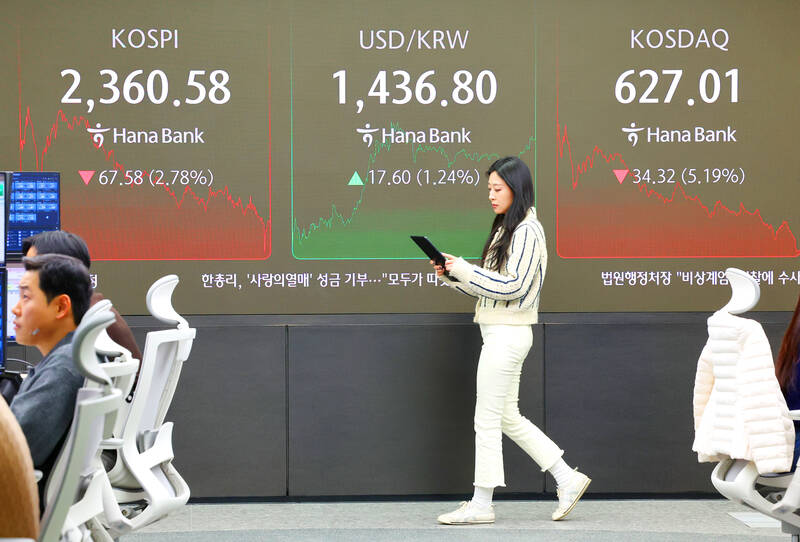South Korean stocks tumbled and the won approached its weakest level since 2009 following a weekend of political turmoil that left investors bracing for a period of heightened volatility.
The benchmark KOSPI dropped 2.8 percent, and the small-cap KOSDAQ index slumped more than 5 percent to its lowest since April 2020. The won fell about 1 percent against the US dollar, heading toward levels reached in the immediate aftermath of South Korean President Yoon Suk-yeol’s botched imposition of martial law early last week.
The main opposition party has said it would push quickly for another vote. While officials in Seoul are pulling out all the stops to prevent a market meltdown, uncertainties over the country’s leadership have cast a pall on sentiment.

Photo: EPA-EFE
“The possibility of the worst-case scenario for the KOSPI has increased,” Daishin Securities Co strategist Lee Kyoung-min said. “Even at a small development, the KOSPI can wobble because of accumulated fatigue, disappointment, extremely dented investor sentiment and supply and demand situations.”
With Yoon facing intense pressure to resign, ruling People Power Party leader Han Dong-hoon on Sunday said South Korean Prime Minister Han Duck-soo would manage the nation’s affairs while his party prepares an orderly exit plan for the president.
Opposition lawmakers slammed the decision as unconstitutional and thousands of people took to the streets to protest.
The standoff could not have come at a worse time for local markets. The KOSPI gauge and the won were among Asia’s worst performers this year even before the martial law fiasco.
Investors were pinning their hopes on the country’s leadership to navigate an uncertain global trade environment following US president-elect Donald Trump’s election win.
The “Value-Up” initiative — a program to improve corporate governance and shareholder returns — was also in need of a stronger push to reinvigorate the flagging stock market.
Financial authorities would mobilize “every possible measure” to minimize the impact on the economy and closely monitor its financial markets around the clock, a joint ministerial statement released yesterday said.
They plan to launch a 300 billion won (US$210 million) fund next week to buy “Value-Up” stocks to help shore up the market, while continuing to deploy the earlier 200 billion won fund.
The 10 trillion won stock stabilization fund is ready to be mobilized “immediately” when needed, the statement said.
While the fund would attempt to turn around investor sentiment, the size would not be enough to quell market fear, Fibonacci Asset Management Global Pte Ltd chief executive officer Jung In-yun said.
As for the South Korean currency, the won has lost more than 2 percent against the US dollar as the political drama unfolded, the only emerging Asian currency to fall against the greenback. Further losses would see the currency reach levels unseen since 2009.
Goldman Sachs Group Inc maintains a below-consensus growth forecast of 1.8 percent next year for South Korea, with “risks increasingly skewed to the downside,” the US investment bank said in a note.

Intel Corp chief executive officer Lip-Bu Tan (陳立武) is expected to meet with Taiwanese suppliers next month in conjunction with the opening of the Computex Taipei trade show, supply chain sources said on Monday. The visit, the first for Tan to Taiwan since assuming his new post last month, would be aimed at enhancing Intel’s ties with suppliers in Taiwan as he attempts to help turn around the struggling US chipmaker, the sources said. Tan is to hold a banquet to celebrate Intel’s 40-year presence in Taiwan before Computex opens on May 20 and invite dozens of Taiwanese suppliers to exchange views

Application-specific integrated circuit designer Faraday Technology Corp (智原) yesterday said that although revenue this quarter would decline 30 percent from last quarter, it retained its full-year forecast of revenue growth of 100 percent. The company attributed the quarterly drop to a slowdown in customers’ production of chips using Faraday’s advanced packaging technology. The company is still confident about its revenue growth this year, given its strong “design-win” — or the projects it won to help customers design their chips, Faraday president Steve Wang (王國雍) told an online earnings conference. “The design-win this year is better than we expected. We believe we will win

Chizuko Kimura has become the first female sushi chef in the world to win a Michelin star, fulfilling a promise she made to her dying husband to continue his legacy. The 54-year-old Japanese chef regained the Michelin star her late husband, Shunei Kimura, won three years ago for their Sushi Shunei restaurant in Paris. For Shunei Kimura, the star was a dream come true. However, the joy was short-lived. He died from cancer just three months later in June 2022. He was 65. The following year, the restaurant in the heart of Montmartre lost its star rating. Chizuko Kimura insisted that the new star is still down

While China’s leaders use their economic and political might to fight US President Donald Trump’s trade war “to the end,” its army of social media soldiers are embarking on a more humorous campaign online. Trump’s tariff blitz has seen Washington and Beijing impose eye-watering duties on imports from the other, fanning a standoff between the economic superpowers that has sparked global recession fears and sent markets into a tailspin. Trump says his policy is a response to years of being “ripped off” by other countries and aims to bring manufacturing to the US, forcing companies to employ US workers. However, China’s online warriors